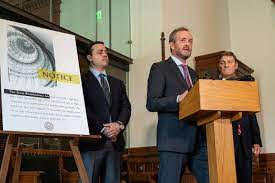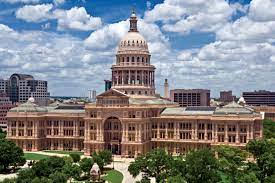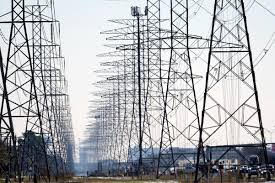
Here’s a quick recap of what happened over the last week:
Aftermath of Paxton Acquittal

Lt. Governor Dan Patrick continues to target House Speaker Dade Phelan on social media, blaming him for a “sham” impeachment in the House and calling the Senate trial unnecessary and a huge waste of taxpayer dollars. Patrick has also questioned Phelan’s immediate reaction to the acquittal saying the Speaker has no right to question the integrity of the Senate after the House went through a “rushed, no-facts, no-record process that failed to achieve the results he wanted.” Patrick has gone on to say that Phelan is “unworthy of his leadership position.”
Phelan responded last weekend through an op-ed he wrote for his hometown newspaper, the Beaumont Enterprise. In a nutshell, Phelan accused Patrick of never committing to have an impartial trial, saying “the fix was in from the start” since Patrick accepted a $3 million donation from a political action committee that aggressively pushed for Paxton’s acquittal.
Since the verdict, Phelan has faced numerous calls to resign his position as Speaker of the Texas House from the conservative wing of the Republican Party and from far-right members of the Texas House. And, last weekend, the State Republican Executive Committee approved a resolution by a vote of 58-2 calling on the Speaker to resign. The resolution cites the House’s failed attempt to impeach Paxton and his appointment of numerous Democrats to committee chairmanships in the House.
Paxton – while continuing to attack his opponents and vowing retribution – is adding state Comptroller Glenn Hegar to the list of adversaries. Paxton is threatening legal action if Hegar does not give Paxton back pay for the time he was suspended. After the House voted to impeach Paxton in May, he was immediately suspended. Shortly after, the Comptroller announced that Paxton would not receive the part of his $153,750 annual salary during his suspension, consistent with parameters laid out in the state Constitution regarding suspensions of state officeholders. Paxton is arguing that he was on “leave” and not necessarily suspended, thus still eligible to receive his paycheck. Hegar has held strong in his interpretation saying the law is clear regarding state officeholders not receiving payment while under suspension. However, Hegar said he is willing to work with Paxton and his staff to seek a formal ruling from the Texas Supreme Court regarding the issue, so it can be settled amicably.
Whistleblowers Continue Legal Fight

The group of former Attorney General employees that originally brought forth the allegations against Paxton that became the subject of the impeachment trial say they will continue their legal fight. The group held a press conference on Monday saying that even though the impeachment trial is over, the legal battle will go on. Paxton reached a $3.3 million settlement with the group earlier this year after the group sued Paxton alleging he fired them for bringing forth the allegations and presenting them to the FBI. Lawmakers refused to pay the settlement and the investigation by the Texas House into the reason for the lawsuit eventually led to the House impeachment of Paxton. The whistleblowers say they want to get the case in a “real courtroom” so Paxton can be forced to testify and – in their words – have to testify under oath or plead the fifth amendment. A trial level and appellate court have both ruled that the former employees have the right to sue Paxton under the state’s whistleblower law. The Attorney General’s office has appealed those rulings to the Texas Supreme Court, which has yet to rule on whether or not the case can go forward. Paxton has argued that statewide elected officials are not subject to the state whistleblower law. The Supreme Court has not given a timeline on when or if they will rule on the case.
Special Session Approaches

Nothing official has been announced yet, but the staff and members at the Capitol are planning for the 3rd special session to begin on October 9th.
Gov. Abbott – only the Governor can determine which items are considered in a special session – has said the session will focus on school choice, or vouchers. Abbott has not outlined a specific proposal for the session, only that he wants lawmakers to consider the school choice legislation. Voucher legislation can take on many forms, but the purpose of voucher legislation is to set up a state funded program that gives parents access to those funds to use for private school tuition. The different aspects of the legislation will be how much each parent can be given and eligibility standards such as income level, special needs, or status of the public school in which their child is currently enrolled.
Texas Comptroller Glenn Hegar addressed the Texas Tribune Festival over the weekend and declared the state has experienced a recent rise in revenue and will have more money to spend than earlier anticipated during the upcoming special session on public education issues. Hegar said he will release the exact figures in his revenue projection that will be released in October, right before the special session is scheduled to convene. Hegar said the strong Texas economy has led to the increased revenues for the state and he said the state can expect at least a $10 billion surplus as they head into the two-year budget cycle. This comes as lawmakers will consider many different issues related to public education this fall, including teacher pay raises and additional state funding to try and decrease recapture payments that property rich districts are forced to pay to help compensate property poorer districts with their funding issues. The legislature increased funding for public education by $4.5 billion during the last regular session that ended in May. This unexpected influx of cash opens the possibility that lawmakers will consider more than just vouchers during the special session, but the Governor has not committed yet to open the call to other issues related to public education.
In addition to school choice legislation, Abbott committed earlier this week to add issues related to the Colony Ridge development in Liberty County near Houston. Colony Ridge is a controversial development covering about 60 square miles that has grown by some estimates to have as many as 75,000 inhabitants. The developers allegedly have very lax – or no – requirements for purchases of land and homes there meaning there are no building codes or minimum safety requirements. Furthermore, due to the lack of oversight regarding the financial transactions between the developer and the residents, there are concerns that this is further encouraging illegal immigration and there are even reports of drug cartels operating in the development. The rapid growth in the area has also caused increased crime rates and put a strain on local schools. Because of all of these concerns, Gov. Abbott has promised to add oversight of the Colony Ridge development to the issues under consideration for the special session. Again, he has not offered any specifics or put forth any proposals for reform, he has only committed to have the development scrutinized during the special session. Local officials in Liberty County welcome state intervention and oversight of the development. The Liberty County Judge has said the county has been trying to get the state’s attention for years, all falling on deaf ears until recently. It is worth noting that Abbott has received over $1 million in contributions from the developer of the project.
ERCOT Says Grid Ready for Fall Months

ERCOT released a new seasonal assessment this week that anticipates the electric grid having no problem meeting demand for at least the next two months as the temperatures are expected to be much milder in the months of October and November. Last weekend however, statewide temperatures – reaching 104 in Austin last Sunday – put even further strain on the already weakened grid. ERCOT is predicting maximum demand for the grid over the next two months to be at roughly 70,000 megawatts, down substantially from the peak demands of over 95,000 megawatts during August and early September. ERCOT says they will routinely have at least 99,000 megawatts in reserve to easily meet demand before the winter temperatures arrive in mid-December. Winter will bring new challenges, as solar energy as a source of power is all but eliminated during the winter months when cloud cover dominates, and the daylight hours are much shorter. ERCOT officials say they are currently inspecting all sources of power throughout the state to ensure they have adhered to all weatherization requirements that have been put in place to avoid the same types of shutdowns that forced rolling blackouts in the winter of 2021.
One new source of power that could help the grid meet demand for power is the ability to tap into battery systems. Developers of high energy storage batteries have flocked to Texas recently due to the troubles the grid has experienced with supply/demand issues. The developers of the battery storage units have taken advantage of the Texas market and have found that they can buy energy off the grid in the early morning hours when demand is low, and sell it right back to the grid at a significantly increased cost later in the day. There are reports that some companies can buy one megawatt for $20 in the morning, store it during the day, and sell it back to the grid for $5,000 in the late afternoon hours when demand is at its peak. In addition to this, battery operators can buy power in times of low demand and store it for unlimited periods of time, thus giving the grid operators another source of power in times of extreme temperatures.
If you are interested in monitoring grid conditions, go to the ERCOT website: https://www.ercot.com
Border News

As the border crisis grows, the Biden administration announced earlier this week that it would offer temporary legal status to roughly 472,000 Venezuelans that have arrived in the US since July 31st. The administration says this is necessary to make it easier for this group to get work in the US and will lead to a more orderly immigration system. Many – including Republican officials and officials in border towns – have criticized the move saying it will do nothing more than encourage even more crossings into border towns that are already overwhelmed with migrants in their cities. Venezuelans make up the largest share of migrants over the last year, with an estimated 168,000 having arrived since October of 2022. Since March of 2021, an estimated 243,000 have arrived in the US and already qualified for temporary status due to their request for asylum. According to the University of Syracuse’s Clearinghouse, Texas courts alone have processed over 60,000 notices to Venezuelans to appear to defend their request for political asylum.
As the cities of El Paso and Eagle Pass struggle to find shelter, food, and other resources for the increasing number of migrants crossing the border, the US Customs and Border Patrol announced this week they have reached an agreement with Mexico to deport migrants that have been expelled from the US. Mexico is now realizing pressure on their northern cities of Juarez, Piedras Niegras, and Tijuana due to migrants being expelled and waiting to try again to cross into the US. CBP will work with Mexican officials to turn over the migrants that have been taken into custody in the US for deportation by Mexican officials.
Last week alone, the CBP reports they took 2,500 individuals into custody in just the Eagle Pass area, including at least 800 on Friday. In August, CBP is reporting they took 957 migrants per day into custody in the Eagle Pass region. In El Paso, the mayor reported earlier this week that their city is receiving an estimated 2,000 migrants per day over the last week. That is nearly double the 1,073 encounters the CBP reported for the El Paso region per day in August. The El Paso mayor also estimates that CBP is currently releasing 1,200 migrants per day into the city.
El Paso has set up a Migrant Situational Awareness Dashboard to keep track of and raise awareness of the issues they are facing regarding the situation at the border. The website can be found here: https://app.powerbigov.us/
Political Notes
The biggest political news of the week has to be the announcement by Dallas Mayor Eric Johnson that he has switched to the Republican party. Dallas is now the largest US city with a Republican mayor. Johnson served nearly 10 years in the Texas House as a Democrat before his election as mayor of Dallas in 2019. Johnson said that the Republican party’s priorities of supporting law enforcement, lowering property taxes, and fostering a business-friendly environment align more closely with his vision for the city.
State Representative Tony Tinderholt, a Republican from Arlington, has drawn a Democratic opponent for the 2024 election. Denise Wilkerson announced this week she will challenge Tinderholt next year in the Tarrant County district that covers parts of Arlington and Hurst. She is the only announced candidate against Tinderholt to date. Tinderholt is one of the most conservative members of the House, and ran for House Speaker in 2023, but only received three votes against incumbent Speaker Dade Phelan. Tinderholt has also publicly called on Phelan to resign in the wake of the Paxton impeachment verdict. Tinderholt defeated Democrat Dennis Sherrard in 2022 by a 56-43 margin.
Democratic Congressman Henry Cuellar of Laredo has drawn a Republican opponent in the south Texas district that was targeted by the Republican party for takeover in 2022. But after Cuellar defeated a well-funded opponent in the general election last year by 14 points, the Republicans are not targeting Cuellar this year. Cuellar’s former district director Jose Sanz announced he is challenging Cuellar as a Republican in 2024, saying the district needs a proven conservative, and is prioritizing the issues of border security, government spending, and law enforcement. Cuellar has twice also fought off challenges from Jessica Cisneros of the Democratic party, who forced Cuellar into a runoff in 2022 but then lost by a larger than expected margin in 2024. Cisneros has not made a decision on whether or not to challenge Cuellar for a third time in 2024. Cuellar was first elected to Congress in 2004 and is the only Texan that serves on the powerful Appropriations committee.
The November election is now less than 6 weeks away, with the Houston mayoral race garnering the most attention in this off-cycle election year. Congresswoman Sheila Jackson Lee received the endorsement of former US House Speaker Nancy Pelosi this week. Pelosi applauded Jackson Lee’s ability to advocate for the city of Houston in Congress and her continuing defense of women’s rights issues. Jackson Lee is locked in a tight race with state Senator John Whitmire, and most pundits believe the race will go to a runoff between these two candidates.
Condolences to the family and friends of former state Senator Bob Glasgow who passed away last weekend at the age of 81 after a short battle with cancer. Glasgow, a Democrat from Stephenville, served 12 years in the Senate before being defeated in 1992 by Senator Jane Nelson of Flower Mound in an election that began the trend of a Republican takeover of seats previously held by longtime rural, conservative Democrats. He served as chairman of the State Affairs Committee and was President Pro-Tempore of the Senate in 1991.
What’s Next??
With the impeachment trial over, we are now on special session watch. Rumors have the third special session starting October 9th, but no date has been confirmed. We should receive an official announcement this week. Once the date is made official, members can start filing legislation for the special session.
